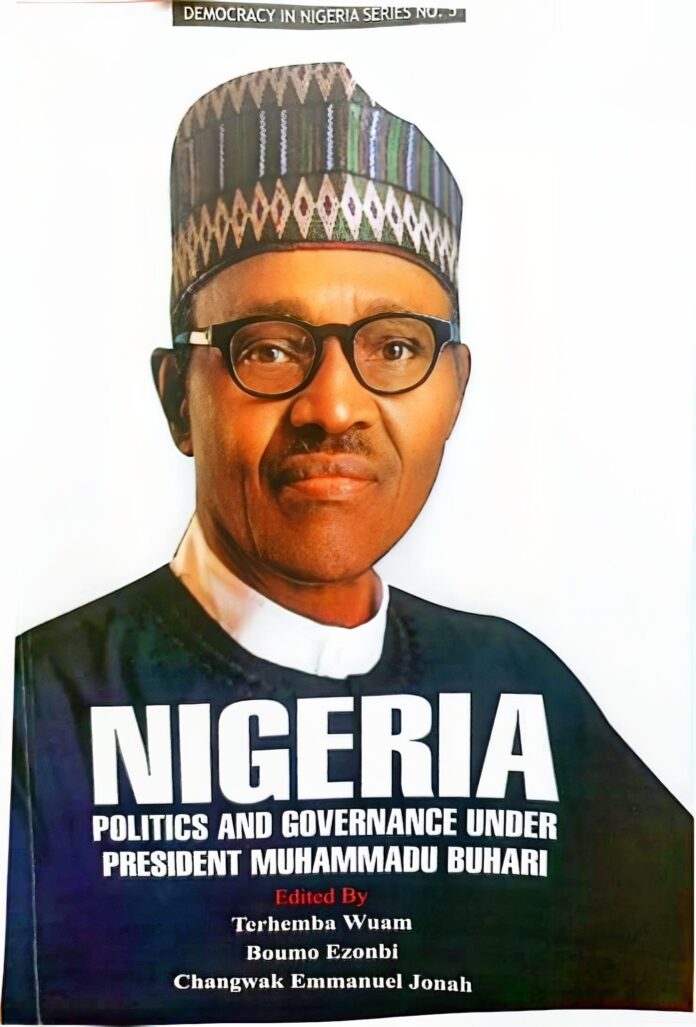The following chapter is from “Nigeria: Politics and Governance under President Muhammadu Buhari Edited By Terhemba Wuam, Boumo Ezonbi and Changwak Emmanuel Jonah (2024)”
The Organized Labour in Nigeria during Muhammadu Buhari Administration 2015-2023
Jatau, David Polang, Ph.D
Senior State Secretary & Researcher, Association of Senior Civil Servants of Nigeria (ASCSN) National Secretariat, Area 7 Garki Abuja. jdpolang@gmail.com 08033916112.
Introduction
The year 2015 witnessed the election and assumption into power President Muhammadu Buhari of the opposition All Progressives Congress (APC) who defeated the incumbent President Goodluck Ebele Jonathan of the People’s Democratic Party (PDP). It was the second coming of Muhammadu Buhari, having served as a military president of the country between 1983 and 1985. The intense and acrimonious political campaigns that preceded the 2015 general elections, grounded governance and affected government-labour relations. Just as the year 2015 was a transition year for the country, it was also a transition year for the organized labour made up of trade unions grouped under the Nigeria Labour Congress (NLC and the Trade Union Congress of Nigeria (TUC). In particular, the NLC conducted an elective Delegates Conference which held first at the International Conference Centre and then the Eagle Square in Abuja between February and April, 2015. The outcome of the election was controversial as it ended in fracas and crises. It divided the congress along public-private sector union lines. The Convention which produced Comrade Ayuba Wabba of the Medical and Health Workers Union of Nigeria (MHWUN) as the president of NLC, led to the breakaway of some mostly private sector unions led by the Comrade Joe Ajaero of the National Union of Electricity Employees (NUEE), the power sector haven been privatized, and Comrade Igwe Achese of the National Union of Petroleum and Natural Gas Employees of Nigeria (NUPENG), to form the United Labour Congress (ULC). Other major trade unions in the Ajaero’s faction included National Union of Food, Beverage and Tobacco Employees (NUFBTE), Nigeria Union of Railway Men (NUR), and National Union of Air Transport Employees (NUATE) [1]. The decision, according to Comrade Ajaero was ‘because of the exigency of the moment’ [2] several meetings were held to resolve the internal crises in the labour movement to no avail. The end result was the break-away of some mostly private sector trade unions to form the ULC [3]. The crises in the labour movement continued even with the historic February 2018 when the NLC celebrated 40th anniversary since its formation in 1978.
The crises in the organized labour continued up till the end of President Buhari’s first tenure in 2019. It only subsided in the year 2020 when, with the intervention of veteran labour leaders in the country, the ULC faction of the NLC agreed to reunite after it was promised the presidency of the congress and other positions in the labour movement in 2023. On the other hand, there were lots of industrial crises in the public and private sectors on the eve of the coming to power of the Buhari administration in 2015. The most obvious among these was the strike by University lecturers under their Union, Academic Staff Union of Universities (ASUU) whose industrial action became an issue in the political calculation of the 2015 elections [4]. This and other serious trade union disputes such as the strikes by the Resident Doctors in the health sector which became obvious during the pandemic months of the year 2020, continued up to the end of the Buhari administration in 2023.
Interference into the affairs of the organized labour
The Federal Government under President Muhammadu Buhari capitalized on the crises in the labour movement and infiltrated the leadership of the organized labour to find its way around some knotty labour issues. Immediately it came on board on May 29, 2015, it increased price of premium motor spirit (PMS) from N87 to N96 and then to N145 in April 2016. The labour movement was as usual not receptive to a hike in fuel price in the face of dwindling workers’ income already affected by inflation. The organized labour planned a strike action which it fixed to commence on 18th May, 2016, the federal Government through the Federal Ministry of Justice, approached the Industrial Court to stop the strike action. After exchange of legal arguments, the Court Okayed the strike on the basis that Nigeria was a member of the International Labour Organiztion (ILO) which recognized strike as a negotiation tool by workers. [5] However, after series of negotiations, while the NLC insisted on embarking on the strike action and boycotted further negotiations with the Government, the TUC agreed to shelve the strike [6] with an assurance from the Federal Government for a palliative for workers and Nigerian masses as an alternative. According to the TUC President, Comrade Bobboi Bala Kaigama:
“The NLC came to the negotiation table with only one item, which was that the price of fuel be reverted to N86 per litre, even though the meeting with government afforded labour opportunity to address the contending issues once and for all… we drew the attention of our NLC colleagues that there was no reason we should be persistent about one position. Let us proffer alternative positions but they insisted. And the TUC said we were given a first and alternative mandates by our executives and this is our alternative. Then we asked them to see reason with our own alternative but they said no. that was where disagreement entered… it is important that in terms of taking decisions that will affect the masses, one does not take a fanatical position.” [7]
Meanwhile, the federal government had exploited the internal crises in the NLC which led to the breakaway by some industrial unions including the NUEE, NUPENG and the NUTGTWN to form the United Labour Congress (ULC) as stated above. The then Secretary to the Government of the Federation, Babashir David Lawal got the TUC and the ULC to sign a communiqué to suspend all industrial actions on the matter. [8] The TUC justified its decision to suspend the planned strike action on the basis of the faction in the NLC and advice from its own oil sector affiliate, Petroleum and Natural Gas Senior Staff Association of Nigeria (PENGASSAN) who together with a sister oil sub sector trade union, the Nigeria Union of Petroleum and Natural Gas Workers (NUPENG), advised against the strike action. [9] PENGASSAN discussed the situation in the oil industry at the union’s National Executive Council (NEC) meeting early in 2016 and resolved to shelve the planned strike action for the federal government to fix the refineries in Kaduna and Port Harcourt as well as to stop the import-driven refined crude oil regime. [10] Both PENGASSAN and NUPENG who are oil industry trade unions, jointly agreed on that. [11] There was also the pressure and appeals from prominent political leaders led by Bola Tinubu who, in company of former NLC President Abdulwahid Omar, former Director-General of the National Orientation Agency (NOA), Alhaji Idi Farouk, Senators Kabiru Marafa, Abdulkarim Daiyabu and Othman Hunkuyi [12] met with the leadership of the organized labour and appealed to them to shelve the planned strike.
Many people within and outside the labour movement had understood that the division over the 2016 strike action was not unconnected with the pre-2015 electioneering campaigns in the country where labour leaders were accused of pitching tents with political parties. Some supported the incumbent Peoples Democratic Party (PDP) while others supported the All Progressives Party (APC). [13] When the APC government won the elections, its supporters in the labour movement developed cold feet in protesting against the government’s policies including the increase in fuel price [14]. Through-out the period, the other labour centre the, TUC led by Comrade Bobboi Bala Kaigama of the Association of Senior Civil Servants of Nigeria (ASCSN), held the leadership of the labour movement in the country and worked with either faction of the NLC whenever it deemed necessary.
Strikes and Industrial Actions during President Buhari
As noted in our introduction above, there were lots of industrial disputes that led to stoppage of work by members of trade unions on the eve of the Buhari administration. These actions by trade unions became part of the issues during the electioneering campaigns of the pre 2015 elections. For example, the Academic Staff Union of Universities (ASUU) was on strike for almost 9 months in 2014, same time the federal government convened the National Conference and spent about N9 billion. [15] This did not go down well with the opposition political parties. [16] The labour issues accumulated and was so intense that about 132, 228 workers went on strike in 2015 alone as shown in the table 1 below:
Table 1
Summary of Industrial Disputes and Strike Action 2013-2015

Source: Federal Ministry of Labour and Employment
From the table above, about 447 trade disputes were declared by trade unions in the country between 2013 and 2015. About 71 of these disputes resulted in strike actions with 188,094 workers taking part in strike actions across the sectors. Among the workers who embarked on strike action during this period, were the teachers of public universities under their union, ASUU whose strike action was frequent during these years leading to loss of hundreds of economic days. In that particular case, an entire academic calendar was lost to strike action. This was besides internal strike actions by local chapters of the union over local issues which in some cases running into months. As noted above, the ASUU strike became an issue in the political calculation of the 2015 elections [17]. It also shows the extent to which industrial relation issues in the public service affects political governance and contestation for public office in Nigeria. [18] That such magnitude of industrial disputes occurred during civil rule, underscores the fact that democratic rule encourages trade unionism and union activities. [19] This has further been buttressed by the statement from the Minister of labour and Employment, Dr Chris Ngige when he stated that by the end of President Buhari’s first tenure which began on May 29, 2015 and elapsed on May 29, 2019, the Ministry of labour had intervened in 1,425 trade disputes and complaints; 788 disputes were completely concluded and resolved; 37 cases referred to the Industrial Arbitration Panel and 600 cases were at various stages of mediation and conciliation. [20] Some of these disputes however emanated from states of the federation.
Meanwhile, the economic recession that affected the economy of the country between 2015 and 2018 contributed to increased trade union actions in the workplaces with trade unions asking for the legitimate entitlements of their members whereas employers of their members complained of poor income in the light of dwindling income with which they use to pay salaries and wages. Indeed, within this period, payment of workers’ salaries became part of state governor’s achievement in the build up to the 2019 electioneering campaigns. [21]
The sudden upsurge of trade union activities, became a source of great concern to the President Muhammadu Buhari led Federal Executive Council in 2018. In April 2018, the Federal Government took a decision based on a memo brought to it by the Minister of Labour and Employment, Dr. Chris Ngige. The memo sought to stop what it referred to as ‘political labour leaders’ who hold political leadership in trade unions perpetually. The authorities believed that once such elements in the labour circle are stopped; it will check growing industrial unrests in the country.
In another report from the ministry of labour and productivity, between 2016 and 2018, the Public Sector witnessed about 977 trade disputes. About 894 of these disputes were apprehended while 30 disputes were referred to the industrial Arbitration Panel (IAP) for arbitration and resolution [22]. Many of these disputes are inter-union disputes over unionization of workers. These inter-union crises affect relationship among trade unions which in-turn affects how they relate in the labour centre. However, many of these disputes are the union’s drive to ensure the welfare of its members is attended to by the employers. An example was the strike action embarked upon by the ASCSN in April 2017 in some selected Unity Colleges whose workers were owed various months of salary arrears. The affected workers were in colleges across the country which included FGC Nise, Anambra State; FGC Ikirun, Osun State; FSTC Ilesa, Osun State; FSTC Doma, Nasarawa State; FSTC Otukpo, Benue State; FGC Warri, Delta State; FGGC Omu-Aran, Kwara state and FGC Rubochi in Abuja. [23]
Some of these disputes emanated from states of the federation. For example in Nasarawa State alone, between 2014 and 2018, over 22 strike actions were undertaken by various labour unions in the state. [24]These do not include other numerous industrial disputes between the employees and their employers that was managed and resolved without recourse to the minister of labour’s office. The public sector has witnessed the greatest percentage of the industrial crises. [25] These crises included the 2016 partial nationwide strike action led by the Nigeria labour Congress due to increase in fuel price from N97 to N145, strikes by many labour unions in the education, health and judicial sectors [26]; as well as the series of strike notices by the organized labour as a result of a new minimum wage negotiations and its implementation that dragged for about 3years at the federal level and several years at the state level. Many states were unable to implement the 30,000 national minimum wage up till the end of the Buhari regime in May 2023.
However, the Buhari administration reorganized the Joint National Public Service Negotiating Council (JNPSNC). The JNPSNC which is the negotiating arm of the Government-Labour relations, devised a constitution during this period. The latest review was done in 2018. The document is a veritable instrument for guiding the operations and activities of the Trade Unions at the Federal and State levels. It is a control tool for the Unions to conduct their affairs properly in order to engender orderliness among their members in their relationship with the employers, particularly in the public sector, which will in effect translate to Industrial Peace and harmony [27]. Under this body and at its meetings, the body can take decisions on workers welfare including decision to embark on industrial actions. [28] Using this body and despite their differences, the Trade Unions in the Council sometimes agree on issues of mutual benefits to their members. For example between 2015 and 2018 they all agreed and presented a common position on a new National Minimum Wage, the need for the inclusion of the Trade Union Side in the National Council on Establishment (NCE) [29], the need for an upward wage review in the civil service and in 2018 they each presented a memo all on “memorandum on the need for upward review of retirement age in the core civil service to 65 years of 40 years of service whichever comes first” [30]. The Buhari administration approved the upward retirement age for Teachers in the federal public service.
Rallies and Street Actions by the Organized Labour during President Buhari
There were rallies and street show by the organized labour during the administration of Muhammadu Buhari. On 8th August, 2016 the organized labour organized a mass rally against electricity tariff hike. The workers were led by the NLC President Ayuba Wabba, the TUC President Bala Kaigama and Professor Dipo Fashina, former ASUU National President. The team presented Labour’s position in a letter to the Presidency and leadership of the National Assembly.
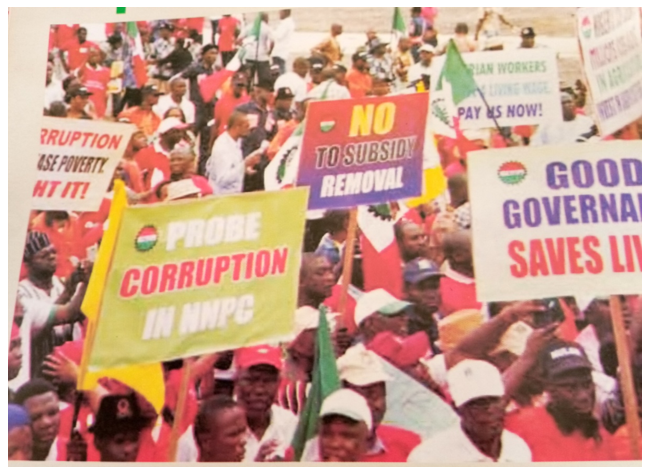
Figure 5: A typical protest and street show by the organized labour and its allies.
The protests were not necessarily always against government policies. There are instances where labour supported government policies it perceived as workers and masses friendly. In 2016, the organized labour matched in support of APC’s government anti-corruption war. Similarly, it protested against what it called illicit financial flow out of the country in 2016 when it frowned at financial flows out of the country to Europe and Asia and America by government officials and business men. Between 2016 and 2018, the organized labour embarked on protests in major cities of Lagos, Port Harcourt, Enugu and Abuja to request for a new minimum wage for workers.
Prior to the struggle for a new national minimum wage, the organized labour had had to intervene in some states such as Nasarawa where the State government attempted to unilaterally review the salary table and in Imo State where the State Government reduced work-week and forcing workers to go to farm as well as Kogi State where the Government attempted to lay-off workers. The Imo State Government went ahead to sack over 6,000 workers in January 2016. On Wednesday 10th February, 2016, the organized labour led by the National president of NLC, Comrade Ayuba Wabba and that of TUC Comrade Bobboi Bala Kaigama stormed Owerri the Imo State capital to protest the mass sack of government workers of the state. According to the Worker Magazine:
The protest rally blocked major entrance and exit point into the State Government House, Owerri, took off from the Imo State Secretariat of the Nigeria Medical Association (NMA) along Port Harcourt road, shut down traffic at the Sam Mbakwe International Cargo Airport where flight operations were halted by NUATE, a Union from the Aviation sector. [31]
That massive act of solidarity with the sacked workers of Imo State government paid off as the state Governor, Rochas Okorocha later rescinded his decision and reinstated the workers. The Imo protest and joint labour action shows harmony among labour leaders across the divide. Its execution- workers convergence at the Imo State Secretariat of Nigeria Medical Association (NMA) and the support received from the Aviator Union showed high level of inter union collaboration and labour solidarity.
The Nigeria Labour Congress resolved that Tuesday 23rd August, 2016 be observed as a day of solidarity and mourning of workers who lost their lives and those who were injured. The day was also to be observed as a day of protests of the obnoxious policies of various state governments and non-payment of salaries, gratuities and pensions. [32] In Nasarawa State, workers under the organized labour embarked on strike to protest Government’s plan to slash workers’ salaries. A protest on Friday 29th July, 2016 had led to an ugly situation where two members of the Union were killed by the police in front of the Government House.
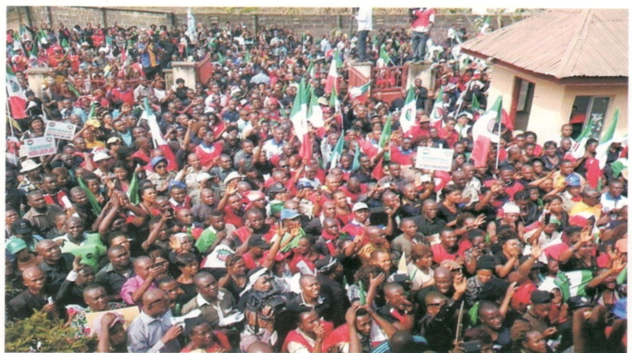
| Figure 6: Imo Rally |
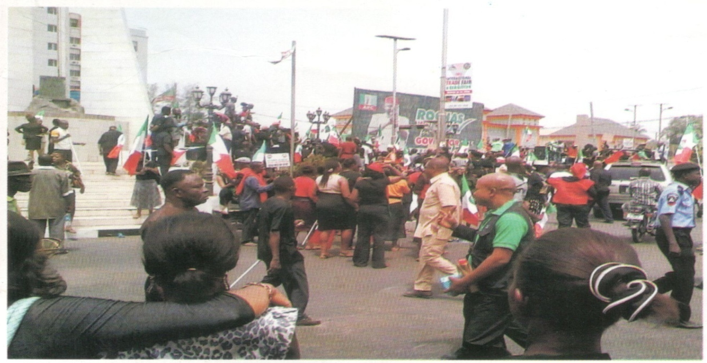
| Figure 7: Imo Rally |
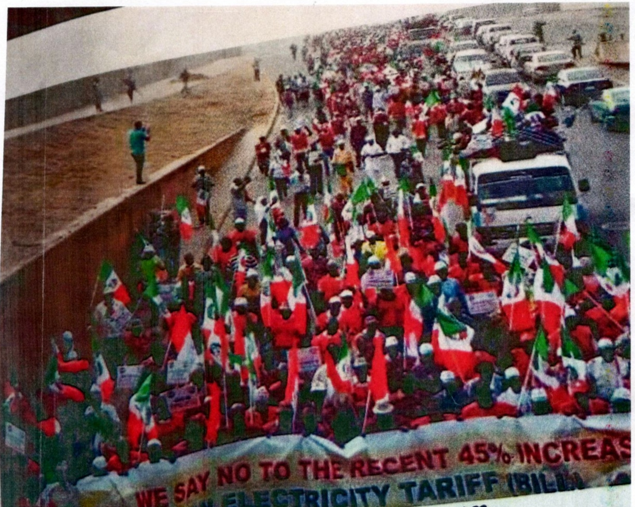
| Figure 8: Electricity Hike Protest |
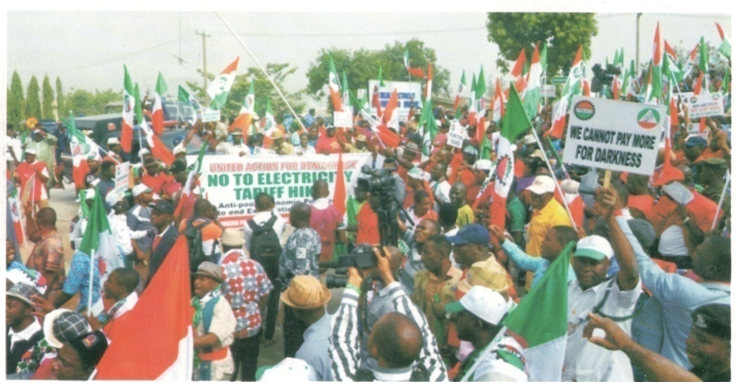
| Figure 9: Electricity Hike Protest |
President Buhari’s Second Tenure 2019-2023
Between 2019 and 2023 President Mohammadu Buhari’s government took four major actions, decisions and indecision that affected government-labour relations in the country. They included the concession of major Airports, increased electricity tariff [33] and increased petroleum pump prices. There was also the strike actions in the education sector, some of which are spill over actions from the era even predating Buhari’s first tenure. Chiefly among these were the actions by the Academic Staff Union of universities (ASUU) when it went on strike on a total of 655 working days between 2016 and 2023. See table 2 below. Other Unions in the education sub sector such as Senior Staff Association of Nigerian Universities (SSANU), Non Academic Staff Union of Education and Associated Institutions (NASU) as well as National Association of Allied Technologists (NAAT), aslo embarked on actions during this time. These attracted protests and in some instances outright strike actions by organized labour. Between 2017 and 2019, the SSANU, NAAT and NASU went on strike jointly lasting for about 116 days. [34] On august 31 2020, Aviation sector employees under their unions, the Nigeria Union of Aviation Employees NUATE and ATSSAN protested the planned concession of the airports. [35] In the 2020 alone, the Government increased fuel price four time. N121.50k on May 1, N140.80k in July, 145.80k in August and 151.56k in September. [36]
The year 2020 was a pandemic year due to the global scourge of Covid-19 pandemic that eventually led to the death of 3,155 persons in Nigeria as at December 2023. [37] Health sector workers who managed patients in the health care facilities and were also among the victims, agitated for hazard allowances. In the year 2020 alone, Resident doctors went on nationwide strike actions two times between June 15- June 22, and September 7th. [38] Between 2015 and 2023, the Doctors under their unions of National Association of Resident Doctors (NARD), Nigeria Medical Association (NMA) or Joint Health Sector Unions (JOHESU), went on strike for a total of 153 working days. [39]
Table 2
Strike Action by ASUU and Number of Days Spent 2015-2023
| Year | No. of days spent |
| 2016 | 7 |
| 2017 | 35 |
| 2018/2019 | 97 |
| 2020 | 276 |
| 2022 | 240 |
Source: Author’s field work 2018-2022
Conclusion
The President Muhammadu Buhari years 2015-2023 were turbulent years for the organized labour in the country. It is worthy of note that while a new National Minimum Wage law of 30,000 naira was enacted and implemented in 2019, many state governments failed to implement it, resulting in many fracas between the organized labour in the states and their State governments. Though the Federal government extended bail out to the state governments to enable them meet up their financial obligations to their workers, no sanction to states who failed to implement the minimum wage. The minimum wage struggle in the states continued till the end of the Buhari Administration in 2023, just a year before another new national minimum wage will be due. Again, in the Buhari years of 2015-2023, petroleum prices were increased more than 5 times resulting to confrontations between the organized labour and the government, while electricity tariff witnessed increase as Distribution Companies reviewed electricity tariffs upward. In the second tenure of President Buhari, the organized labour under the ages of the NUATE and ATSSSAN protested concession of major airports in the country, just as Resident Doctors and University Lecturers went on strike separately for months to protest lack of payment of salaries, allowances and other entitlements. That particular ASUU struggle was an issue before and during the Buhari administration. The end remains very far in sight.
[1] See “25 Unions Announced Formation of a new labour centre” Vanguard Newspaper online December 17, 2016 accessed on March 8, 2018.
[2]Vanguard Newspaper online December 17, 2016 accessed on March 8, 2018.
[3] See Mustafa Suleiman, “A Tale of Two Labour Unions” Daily Trust News Paper, January 7, 2017.
[4] See Goodluck Ebele Jonathan, My Transition Hours, (Kingwood USA: Ezekiel Books), 2018, 108.
[5] Mustafa Suleiman, ‘National Industrial Court Okays Strike action” , Daily Trust Newspaper, Monday July 18, 2016, 35.
[6] Ugo Chuks Okolie and Sebastine Agbefe, “A Critical Study of the Key Challenges of Trade Unionism in Nigeria’s Fourth Republic”, International Journal of Research in Humanities and Social Studies, Vol. 7, Issue 11, (2020), 22.
[7] Daily Labour Newspaper, Thursday June 2, 2016 Vol. 31, No. 5, 3.
[8] See Mohammed Ozigi and Clinton Uranta, Labour Leadership and Society (Lagos: Daily Labour Publishers, 2019), 22; 51-53.
[9]For analyses of this see Mohammed Ozigi and Clinton Uranta, Labour Leadership and Society (Lagos: Daily Labour Publishers, 2019), 22; 51-53.
[10] Interview with Comrade Festus Osifo 28/4/2016 at the Labour House Abuja.
[11] Interview with Comrade Festus Osifo 28/4/2016 at the Labour House Abuja.
[12] See Daily Labour NewspaperVol.31 No.5, June 2, 2016, 1-2.
[13] Oral Interview with Jimoh Mohammed 26/8/2018 in Abuja.
[14]Oral Interview with Comrade Ajiboye Ayodeji 20/1/2018 in Lafia Nasarawa State.
[15] See The Leadership Newspaper, October 4, 2017 quoted in Goodluck Ebele Jonathan, My Transition Hours, (Kingwood USA: Ezekiel Books), 2018, 108.
[16] See The Leadership Newspaper, October 4, 2017 quoted in Goodluck Ebele Jonathan, My Transition Hours, (Kingwood USA: Ezekiel Books), 2018, 108.
[17] See Goodluck Ebele Jonathan, My Transition Hours, (Kingwood USA: Ezekiel Books), 2018, 108.
[18] For analyses of this see David Polang Jatau, “A Comparative Study of Trade Unions in the Public and Private Sectors of Nigeria, 1978-2018” A Ph.D Thesis in the Department of History and International Studies, Submitted to the School of Post Graduate Studies, University of Jos, August, 2023, 209-231.
[19] See Jatau David Polang and Kigbu Yakubu Paul, “Wage Labour, Trade Unionism and the Issue of Productivity in the Nigerian Civil Service, 1999-2016” , Patrick I. Ukase et’al (eds), History, Globalization & Relations in Africa, Lagos: Intergrity Publishers, 2018. 781-795.
[20] See Daily Trust Newspaper August 26, 2019, 32.
[21] See Jatau David Polang and Kigbu Yakubu Paul, “Wage Labour, Trade Unionism and the Issue of Productivity in the Nigerian Civil Service, 1999-2016” , Patrick I. Ukase et’al (eds), History, Globalization & Relations in Africa, Lagos: Intergrity Publishers, 2018. 781-795.
[22] Federal Ministry of Labour and Employment, Trade Dispute in the Public Sector from 2014-March, 2018
[23] See The Bureaucrat, News Letter of the Association of Senior Civil Servants of Nigeria, Vol. 12. No. 2. “Association Suspends Strike in Unity Colleges” June, 2017, 3.
[24] Yairus Gbeba Dagusa, “Industrial Relations and Productivity in Nasarawa State Civil Service: An Assessment”,
An Individual Research Project submitted to the National Institute for Policy and Strategic Studies (NIPSS), Kuru, Senior Staff Executive Course 41
[25] See David Polang Jatau, “A Comparative Study of Trade Unions in the Public and Private Sectors of Nigeria, 1978-2018” A Ph.D Thesis in the Department of History and International Studies, Submitted to the School of Post Graduate Studies, University of Jos, August, 2023. 162.
[26] See Mahmud Jega, “Five Years of Buhari: A Stlye and Record all His Own” in Daily Trust Newspaper, Wednesday May 28, 2020, 19-20.
[27] See Didi Walson-Jack, Preface to the Constitution of the Joint National Public Service Negotiating Council, November, 2018, iii.
[28] Interview with the Secretary of Joint Council, Comrade Alade Bashir Lawal during the Separate Council Meetings of the Unions in Sokoto, Sokoto State on 11/9/2019.
[29] The Bureaucrat, News Letter of the Association of Senior Civil Servants of Nigeria, Vol. 13, No. 2 “Demand for Wage Review in the Civil Service” June, 2018, 6
[30] See Programme of Event for the 2019 Separate Meetings of the National Public Service Negotiating Councils 1, 11 & 111 held on Tuesday 10th – Thursday 12th September, 2019, 17-19.
[31] See The Worker, A Bi- Monthly Publication of the Centre for Labour Studies and Advocacy, Abuja, Nigeria Vol. 5 No. 1 January – April, 2016, 33 – 35.
[32] See NLC Letter addressed to all General Secretaries and Presidents of All Industrial unions dated 15th August, 2016.
[33] The Nation, NLC, MAN Kicks as Discos Increased Electricity Tariff, 2nd September, 2020, 1, 8.
[34] See Charles Ogwo, “Unions record over 1,086 days’ Strike Under Buhari” Business Day Newspaper, May 22, 2023. https://businessday.ng/news/article/unions-record-over-1086-days-strike-under-buhari/ Accessed on 21st December, 2023.
[35] The Nation, Aviation Workers Protested Planned Concession of Four Major Airports, 1st September, 2020, 7.
[36] The Nation, NLC Rejects fuel, Power Tariff Hike, 9th September, 2020, 5.
[37] World Health Organization http//covid19.who.int/region/afro/country/ng. Assessed on 14th December 2023.
[38] The Nation, Resident Doctors Begin nation-wide Strike, 8th September, 2020, 1, 36.
[39] See Charles Ogwo, “Unions record over 1,086 days’ Strike Under Buhari” Business Day Newspaper, May 22, 2023. https://businessday.ng/news/article/unions-record-over-1086-days-strike-under-buhari/ Accessed on 21st December, 2023.



